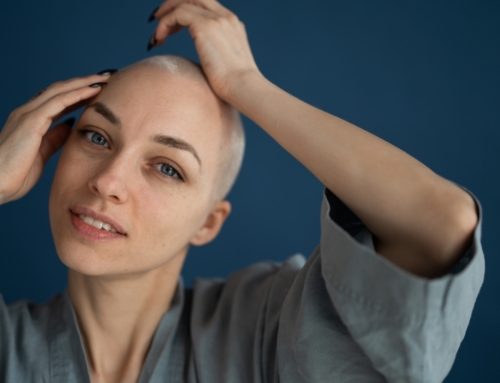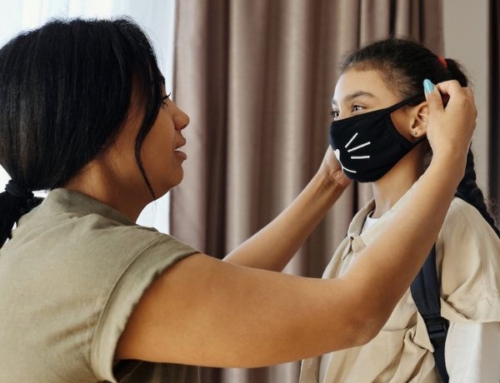The COVID-19 vaccine rollout is underway in Canada, and with it, a rise in questions from the CANAAF Community about the safety of the vaccine for someone with alopecia areata. We’ve asked Dr. Jeffrey Donovan, Canadian dermatologist and hair loss specialist to tell us what we currently know about COVID-19 and alopecia areata.
Q: Since alopecia areata is an autoimmune disease, is there any reason to believe that people with AA may have slightly stronger immune systems – thus offering increased protection against the virus?
A: No, we do not have that data at the present time. There is no evidence right now to believe that patients with alopecia areata will have more protection against the virus.
Q: How safe and effective is the COVID-19 vaccine for someone with alopecia areata?
A: We don’t yet know the precise answer because the COVID 19 vaccine has never been formally studied in patients with alopecia areata. What we do know is that patients with alopecia areata can get COVID 19 and if they get COVID 19 they can either be asymptomatic with the infection, get a bit sick, or get really sick and even die. That information we do know.
As far as information pertaining to the vaccine in patients with alopecia areata, we don’t know all the answers yet. There are studies underway to study these sorts of questions in more detail in patients with autoimmune diseases. Right now, we don’t have information. That does not mean that patients with alopecia areata should not discuss the possibility of getting the vaccine with their doctors when their turn comes up. It just means there are some unknowns they need to be aware of. For most patients with alopecia areata, the benefits of getting vaccinated greatly outweigh any risks.
What we do have right now is 2 fairly good sized clinical trials to examine the results. One was conducted by the Pfizer company and the other by a company called Moderna and so they are referred to as the “Pfizer trials” and “Moderna trials,” respectively.
In the Pfizer trial, there were 43,548 participants who received either a placebo vaccine or the real vaccine. There were 8 cases of COVID 19 in those clinical trial subjects who received the real COVID 19 vaccine and 162 cases in those who were assigned to get the placebo vaccine. This equates to 95 % protection. The Moderna trial enrolled more than 30, 000 US participants, including 7000 aged over 65 and 5000 under 65 with high risk chronic diseases. There were 90 COVID 19 cases observed in the placebo group and five were reported in the vaccine group – a similar degree of protection.
It’s important for everyone to be aware that there were no patients with alopecia areata that were formally studied in these trials. These initial clinical trials excluded certain groups of patients – including those with autoimmune diseases. So we don’t know the precise answer.
These Pfizer and Moderna vaccines are special types of vaccines known as “mRNA vaccines.” mRNA vaccines were not been approved for use before in humans, so this is the first time they have been used. It is widely believed that use of the mRNA COVID 19 vaccines for patients with alopecia areata will lead to similar effectiveness (i.e. get high rates of protection after vaccination) and have similar safety as those who do not have alopecia areata. However, those formal studies need to be done. Nobody has done those studies yet so it’s a bit of best guess.
Each and every person with alopecia areata will need to review the risks and benefits with their doctors and what is known about the risks and benefits at the time of vaccination.
The type of advice doctors give in early 2021 is going to be different than the type of advice in mid 2021 because we’ll have so much more data available as time goes on. I have many patients in my practice who have alopecia areata and are already receiving the vaccines. Although I’m watching to see if there are any concerns, big studies will also follow very large numbers of patients. The information that we have available now is limited but it’s going to massively increase as they weeks go by. There’s no reason to believe right now that safety concerns are any different for patients with alopecia areata. But again, this needs study. We do need to determine if patients with alopecia areata who have grown back hair with treatment will have any sort of ‘flare’ of hair loss after getting the vaccine. Right now, we don’t know but the risk would seem quite low.
Q: How safe and effective is the vaccine for someone participating in an alopecia areata clinical trial?
A: There are many alopecia areata clinical trials in the world. At my last look, there were well over a dozen. Each and every patient in these trials will need to check with the clinical trial organizers to see what is currently recommended as far as COVID19 vaccines go.
For clinical trials, the situation is a bit more challenging. It’s important to always remember that we don’t actually know how well the clinical trial drug that is being used in the trial works, because it’s never been studied before. It’s new and so that’s why the clinical trial is being conducted in the first place. Now we add to this a vaccine that we know works in the general population but we don’t know how well it works in those with alopecia areata and we don’t know how well it works in those with alopecia areata who are receiving this clinical trial experimental drug. That’s two unknowns rather than just one.
Therefore, there are many more unknowns for patients in clinical trials. Fortunately, there is likely not reason to believe that in most clinical trials for alopecia areata that a vaccine will be made less effective by being on the clinical trial drug. But those studies need to be done.
All clinical trial participants simply need to check with the clinical trial team. In many cases, vaccines will be permitted but this needs to be reviewed with each trial.
Q: Are people that are currently taking biologics in a clinical
trial, or have taken them in the past, at a higher risk of developing COVID-19 given the immunosuppressive effects of the drugs?
A: First, let’s talk about the immunosuppressive drugs that are used already out in the world and then we’ll come back to clinical trial drugs. We have lots more data on the drugs that are currently available in pharmacies and much less information about experimental drugs in clinical trials.
Right now, it appears that many of the immunosuppressive drugs on the market don’t change the risk of developing severe forms COVID 19 all that much. The one exception might be high doses of oral steroids. For other immunosuppressive drugs, it appears that the risk of developing COVID is not altered all that much. Patients using these drugs can still get COVID, and can still get sick and can still die – but the risks don’t seem any different for the most part than people who don’t use these immunosuppressive drugs.
This is good news and this is the reason why a very large proportion of patients with autoimmune diseases who use immunosuppressive drugs are advised to stay on their medications during the COVID 19 pandemic.
Studies are ongoing but the data so far is clear: most of the immunosuppressive drugs don’t significantly alter the risk of getting COVID. Some immunosuppressive drugs are even being studied for use in the treatment of severe forms of COVID 19 in patients who are in the hospital (i.e. dexamethasone and some types of JAK inhibitors).
As for experimental clinical trial drugs, that information is not widely available but the individual clinical trial organizers will have some data. Clinical trial drugs are experimental and newer and so much less information is available.
Q: Should an individual stop taking an immunosuppresive drug until regional COVID-19 case numbers decrease?
A: Each patient needs to review their individual situation with their doctor. However, for most patients, stopping an immunosuppressive drug is not the recommended course of action during the pandemic. Most of the time, patients will be advised to continue the drug. Other measures like hand washing, physical distancing and wearing a mask are strongly encouraged.





